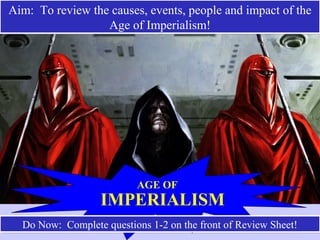
Imperialism Review PowerPoint
- 1. AGE OF IMPERIALISM Do Now: Complete questions 1-2 on the front of Review Sheet!Do Now: Complete questions 1-2 on the front of Review Sheet! Aim: To review the causes, events, people and impact of the Age of Imperialism! Aim: To review the causes, events, people and impact of the Age of Imperialism!
- 2. Regents Question 1. In the past, European nations have conquered other lands, made them into colonies, and controlled their economies. Which term refers to the situation described in this statement? 1. Socialism 2. isolationism 3. imperialism 4. monotheism 2. Throughout the 1800’s, an increased need for both raw materials and new markets for manufactured goods led various European nations to pursue policies of 1. imperialism 2. socialism 3. isolationism 4. communism 3. Imperialism 1. Imperialism
- 3. What is New Imperialism? Imperialism: The political and economic control of one country by another. New Imperialism: A type of foreign policy practiced by European nations and Japan throughout the 1800s and early 1900s.
- 4. Nationalism
- 5. ECONOMY POLITICS & MILITARY SOCIETY SCIENCE & INVENTION • NEED FOR NATURAL RESOURCES • NEED FOR NATURAL RESOURCES •NEED FOR NEW MARKETS •NEED FOR NEW MARKETS •PLACE FOR GROWING POPULATION TO SETTLE •PLACE FOR GROWING POPULATION TO SETTLE •PLACE TO INVEST PROFITS •PLACE TO INVEST PROFITS •BASES FOR TRADE & NAVY SHIPS •BASES FOR TRADE & NAVY SHIPS •POWER & SECURITY OF GLOBAL EMPIRE •POWER & SECURITY OF GLOBAL EMPIRE •SPIRIT OF NATIONALIS M •SPIRIT OF NATIONALIS M •WISH TO SPREAD CHRISTIANITY •WISH TO SPREAD CHRISTIANITY •WISH TO SHARE WESTERN CIVILIZATION •WISH TO SHARE WESTERN CIVILIZATION •BELIEF THAT WESTERN WAYS ARE BEST •BELIEF THAT WESTERN WAYS ARE BEST •NEW WEAPONS •NEW WEAPONS •NEW MEDICINES •NEW MEDICINES •IMPROVED SHIPS &RAILROADS •IMPROVED SHIPS &RAILROADS •IMPROVED RIFLES •IMPROVED RIFLES CAUSES OF NEW IMPERIALISM •White Man’s Burden •White Man’s Burden
- 7. Regents Question 3. The 19th century term “White Man’s Burden” reflected in this cartoon shows the idea that 1. Asians and Africans were equal to Europeans 2. Asians and Africans would be grateful for European help 3. Imperialism was opposed by most Europeans 4. Europeans had a responsibility to improve the lives of the colonial peoples4. Europeans had a responsibility to improve the lives of the colonial peoples
- 8. 4. Both the French and the British were interested in controlling Egypt in the mid-19th century because Egypt had 1. control of the spice trade 2. an industrial-based economy 3. vital mineral resources 4. a strategic location4. A strategic location
- 9. 5. Based on the map, which is an accurate statement about the partitioning of Africa by European imperialist nations during the 1800’s? 1. new nations were based on old tribal boundaries 2. the cultural and ethnic diversity of the African people was disregarded 3. the continent was divided equally among the colonial powers 4. African unity was encouraged 2. The cultural and ethnic diversity of the African people was disregarded Regents Question
- 10. Regents Question 6. During the 19th century, Europeans were able to divide China in Spheres of Influence mainly because the 1. Chinese were eager to adopt western culture 2. Europeans had technologically superior military forces 3. Europeans were willing to adopt Chinese customs 4. Chinese lacked raw materials and resources 2. Europeans had technologically superior military forces
- 12. MEIJI RESTORATION SEPOY MUTINY “JEWEL IN THE CROWN” BERLIN CONFERENCE BOER WAR SHAKA ZULU OPIUM WAR TAIPING REBELLION BOXER REBELLION SINO-JAPANESE WAR BRITISH EAST INDIA CO. MATTHEW PERRY WHITE MAN’S BURDEN SUEZ CANAL “OPEN DOOR POLICY” •SCRAMBLE FOR AFRICA •NATIONALISM •INDUSTRIAL REVOLUTION CECIL RHODES TREATY OF NANJING MANGAL PANDEY •TOKUGAWA SHOGUNATE •RUSSO-JAPANESE WAR GREAT TREK
- 13. IMPERIALISM INDIA AFRICA JAPAN CHINA •BOER WAR •MEIJI RESTORATION •TAIPING REBELLION •BOXER REBELLION •MATTHEW PERRY •JEWEL IN THE CROWN •SINO-JAPANESE WAR•SHAKA ZULU •SEPOY MUTINY •OPIUM WAR •TREATY OF NANJING •WHITE MAN’S BURDEN. •BRITISH EAST INDIA CO. •NATIONALISM •BERLIN CONFERENCE •OPEN DOOR POLICY •SCRAMBLE FOR AFRICA •INDUSTRIAL REVOLUTION •CECIL RHODES •GREAT TREK •MANGAL PANDEY •SPHERES OF INFLUENCE •TOKUGAWA SHOGUNATE •RUSSO-JAPANESE WAR Reasons for
- 15. POSITIVE NEGATIVE POSITIVE NEGATIVE •European medicine & improved nutrition increased life span of Africans. This caused an increase in population. •Modern transportation & communications; telegraphs, railroads, steamships, and telephones •A small minority received improved education and economic opportunities. •European domination led to an erosion of traditional African values and destroyed many existing social relationships •African peoples were treated a s inferior. Forced to work long hours for low pay. •Europeans divided up Africa ignoring tribal, ethnic, and cultural boundaries. These divisions have led to ongoing tribal clashes •New roads & railroads link parts of India •Telegraph & postal systems unite people •Irrigation systems improve farming •New laws mean justice for all classes •British schools offer education •Customs that threaten human rights are ended •Indian resources go to Britain •British made goods replace local goods •Farms grow cash crops rather than food crops; Indians go hungry •Top jobs go to British •Indians are treated as inferiors •Britain tries to replace Indian culture with western ways
- 16. Regents Question 8. During the 18th and 19th centuries, Europeans improved roads and bridges and built railroads in their colonies primarily to 1. provide jobs for the colonists 2. obtain raw materials needed for industrialization 3. impress the colonists with their technological knowledge 4. help missionaries spread Christianity 7. An analysis of the Russo-Japanese War and the Boer War shows that one reason nations go to war is to 1. assist oppressed people 2. spread religious beliefs 3. satisfy imperialist goals 4. honor provisions of a treaty 3. Satisfy imperialist goals 2. Obtain raw materials needed for industrialization
- 17. Can you name these people and events of Imperialism? Can you name these people and events of Imperialism?
